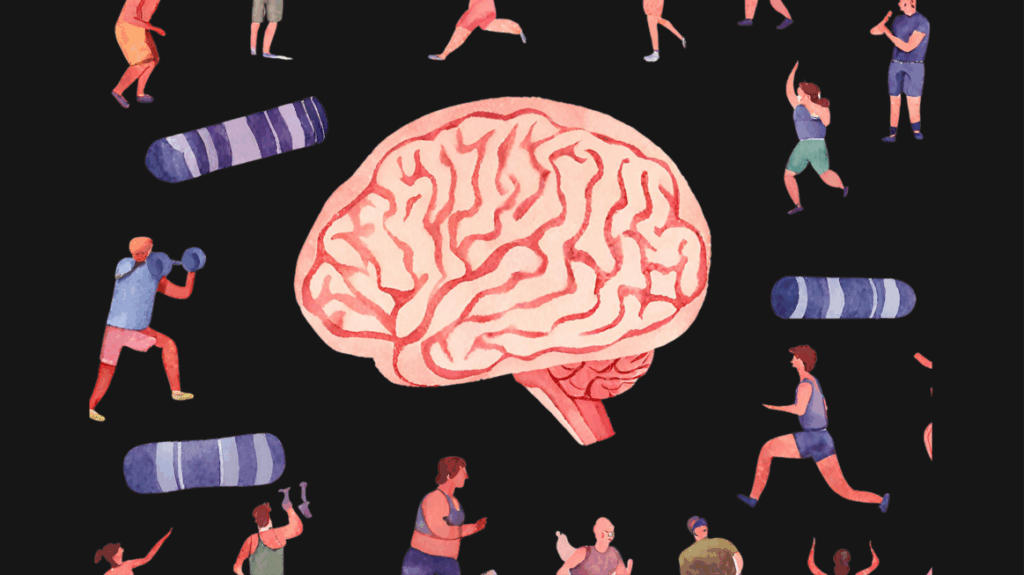Exercise lowers cortisol and releases mood-enhancing neurotransmitters serotonin and dopamine. The endorphins in your brain during exercise cause a natural high and increase blood flow to key brain areas. This biochemical cocktail increases concentration, decision-making making and mental clarity.
Activities as simple as a 10-minute walk can reset mental fatigue and sharpen focus. Find out which exercises improve cognitive function.
The Biochemistry Behind Exercise’s Stress-Busting Power
When you exercise, your body initiates a complex cascade of biochemical reactions that directly combat stress. Physical activity naturally reduces cortisol levels, your primary stress hormone that can wreak havoc when chronically elevated. As you move, your brain simultaneously increases production of mood-enhancing neurotransmitters like serotonin and dopamine.
That biochemical shift produces a dual effect: Lowering physiological markers of stress while increasing compounds associated with positive affective states. Endorphin release in your brain causes natural pain relief and euphoria. Meanwhile, norepinephrine increases, increasing alertness and cognitive function.
Even a moderate 20-minute workout causes these beneficial changes in the biological environment where stress dissolves and mental clarity emerges. So your body is literally rewiring itself to handle the challenges of life better.

How Physical Activity Rewires Your Brain for Enhanced Focus
Exercise doesn’t just temporarily alleviate stress. It fundamentally changes your brain structure over time. Regular physical activity increases the volume of key brain regions involved in thinking and memory, particularly the hippocampus and prefrontal cortex.
When you exercise, you’re triggering neurogenesis, which strengthens neural connections and improves your mental clarity. This process enhances your ability to concentrate, solve problems, and make decisions even during stressful situations.
Cognitive benefits grow with consistency. Even brief moderate activity sessions can increase blood flow to your brain and bring oxygen and nutrients to your brain for brain function. You learn to filter distractions better so you can stay focused when it matters most.

Different Exercise Types and Their Unique Mental Clarity Benefits
While all forms of physical activity can reduce stress, each exercise type offers distinct benefits for your mental clarity and cognitive function. Cardio workouts like running and swimming flood your brain with oxygen, enhancing your ability to process information and solve problems.
Strength training builds more than muscles. It develops mental resilience by teaching your brain to push through challenges. Meanwhile, yoga and tai chi integrate breathing techniques that activate your parasympathetic nervous system, calming racing thoughts almost immediately.
Even brief walking breaks between tasks can reset your mental fatigue. The key is finding exercise routines that you’ll consistently maintain. Your ideal stress-relief strategy might combine different activities: perhaps morning yoga for centering, midday walks for perspective, and evening strength training to release accumulated tension.

Creating an Effective Stress-Relief Workout Routine
A sustainable routine is needed to turn exercising into a stress-management tool, not just an occasional activity. Set realistic expectations first. A mere 10-15 minutes daily can reduce stress and improve focus over time.
Schedule workouts during your natural energy spikes. Good morning exercises can set the mood for the day, and evening sessions release stress. Blend various exercises for maximum benefit. Cardio for endorphin release, strength training for tension relief, and mindfulness practices for mental clarity.
Track mood improvement instead of physical metrics. Notice how better focus correlates with regular exercise.
Real-World Strategies to Maintain Mental Clarity Through Movement
Movement throughout your day outside of structured workouts can help you with mental clarity and stress resilience. Consider adding five-minute walks between long work sessions to refuel your cognitive function and prevent mental fatigue. These little moves act as stress relief valves when deadlines approach.
Change boring activities into movement opportunities. Call while standing, take stairs instead of elevators, or stretch during video meetings. Even gentle desk exercises like shoulder rolls and seated twists can improve blood flow to your brain when you can’t step away.
The cumulative effect of these small actions often delivers more consistent cognitive benefits than occasional intense workouts alone, keeping stress hormones regulated throughout your day.
Frequently Asked Questions
Can Exercise Help With Depression?
Yes, exercise can greatly help manage depression. You’ll boost mood-enhancing chemicals when you work out regularly, reduce symptoms, and improve your overall mental outlook. It’s an effective complementary treatment to therapy and medication.
How Do Exercise Benefits Differ Between Age Groups?
You’ll gain different benefits from exercise as you age. Children develop coordination, teens manage stress, adults maintain mental sharpness, and seniors prevent cognitive decline while improving balance and mobility.
Does Time of Day Affect Exercise’s Impact on Mental Clarity?
Yes, time of day matters. Morning exercise boosts your alertness throughout the day, while evening workouts can relieve accumulated stress. Choose when you’re naturally most energetic for peak mental clarity benefits.
Can Exercise Worsen Stress if Overdone?
Yes, exercise can worsen stress if overdone. You’ll experience physical fatigue, elevated cortisol levels, and mental burnout when you push beyond your limits without proper recovery time between workouts.
How Long Until I Notice Mental Clarity Improvements From Exercise?
You’ll notice immediate benefits after a single workout. Still, consistent mental clarity improvements typically develop within 2-4 weeks of regular exercise as your brain adapts and stress hormone levels stabilize long-term.





